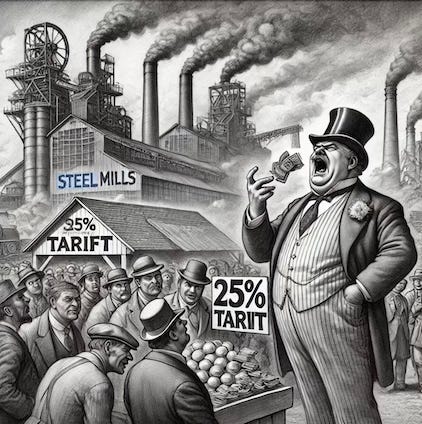Tariff Tantrums: A Hot Mess Since the 19th Century
Turns out, when you make foreign goods more expensive, domestic manufacturers don’t suddenly become more efficient or innovative—they just jack up their prices and sit on their lazy asses.
Oh, look! Another round of economic self-sabotage in the name of ‘protecting American industry.’ How quaint. If history has taught us anything (and, let’s be real, it probably hasn’t because politicians keep making the same damn mistakes), it’s that tariffs are the economic equivalent of setting your own house on fire to keep the neighbors out.
Back in the 1870s to 1909, the U.S. threw itself into a love affair with high tariffs. Spoiler alert: it didn’t go well. Turns out, when you make foreign goods more expensive, domestic manufacturers don’t suddenly become more efficient or innovative—they just jack up their prices and sit on their lazy asses. Meanwhile, labor productivity tanked, and ordinary folks got stuck paying way too much for basic goods. Sound familiar? Buckle up, because we’re about to repeat history like a bad hangover.
Tariffs: The Long, Dumb History
The 19th Century’s Big Protectionist Oopsie (1870–1909)
Back in the Gilded Age—aka the era of robber barons and deeply questionable mustaches—the U.S. slapped tariffs on imported goods thinking it would supercharge American manufacturing. Instead, here’s what happened:
Consumers got screwed: Domestic prices shot up because companies no longer had to compete.
Industries got lazy: Without pressure to innovate, American businesses stagnated.
Global trade partners said ‘Oh, hell no’: Retaliatory tariffs meant American goods rotted in warehouses instead of selling abroad.
And yet, somehow, we’re still having this conversation more than a century later.
Smoot-Hawley: The Tariff That Broke the Economy (1930)
Ah, the Great Depression—already a dumpster fire of an era, and Congress thought, ‘Hey, let’s make it worse!’ Enter the Smoot-Hawley Tariff Act, a textbook example of economic face-planting, raised tariffs by 20%:
Global trade collapsed because other countries hit back with their own tariffs.
American exports nosedived, worsening the economic crisis. U.S. exports fell from $7 billion in 1929 to $2.5 billion in 1932 and farm exports were down by one-third.
Jobs evaporated, because when businesses can’t sell their products, they sure as hell aren’t hiring.
The Post-WWII Glow-Up: Free Trade for the Win
Then, someone in government finally had an epiphany: maybe strangling trade isn’t a great idea. The U.S. signed onto GATT and later the WTO, and surprise, surprise:
The economy exploded (in a good way).
Innovation skyrocketed because competition forces businesses to actually try.
Prices dropped, meaning consumers finally caught a break.
New Tariffs: Who’s Getting Screwed This Time?
Because we apparently love history so much we want to relive its worst parts, the U.S. is now slapping 25% tariffs on Mexico, Canada, and 10% on China. Who’s gonna benefit? Who’s about to get crushed? Let’s break it down.
A few bloated industries—like steel, aluminum, and select manufacturing sectors—that should have been innovating instead of lobbying for government handouts. These industries have spent decades resisting modernization and efficiency improvements, preferring instead to rely on tariffs as a crutch to protect their outdated business models.
The government—because tariffs are basically a sneaky tax on the people they claim to help. An estimated $1.2 trillion between 2025 and 2034 on a conventional basis
Corporate execs—who will keep raking in bonuses while workers get pink slips.
Losers (Pretty Much Everyone Else):
Consumers—because tariffs = higher prices on everything from food to tech.
All Americans — our taxes will increase an average of more than $830 per US household in 2025
Small businesses—who rely on imported materials and will now pay out the nose for them.
Exporters—because other countries are about to slam U.S. goods with tariffs of their own.
The economy—because limiting trade makes growth screech to a halt. Duh.
Prediction: It’s Gonna Suck
If you thought inflation was bad before, just wait. Higher costs, job losses, and yet another trade war on the horizon—because we can’t seem to learn from past disasters. If you’re an average American, get ready to pay more and get less, while politicians and billionaires pretend this was a brilliant idea.
History keeps trying to teach us a lesson, and we keep flipping it the bird. So, let’s all grab some popcorn and watch the economic chaos unfold—again.
Just out in paperback! The Rebel’s Playbook, A How-To Guide for Resistance. A no-nonsense, take-no-prisoners manual for standing up to authoritarianism and keeping freedom alive. Forget doomscrolling and despair—this guide is packed with inspiring stories of badass women throughout history who stared fascism in the face and said, “Not today, dictator.”






